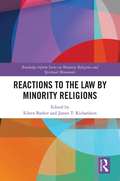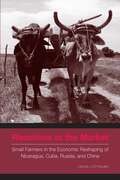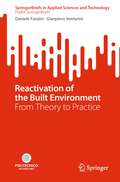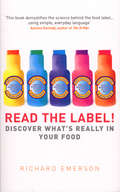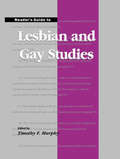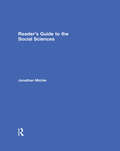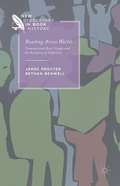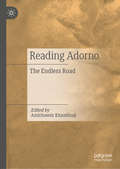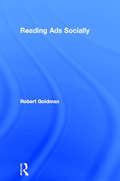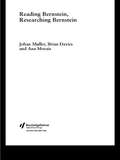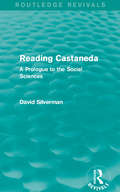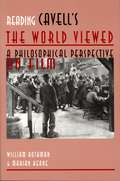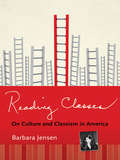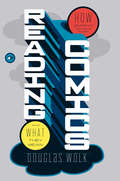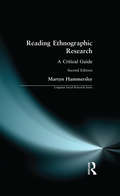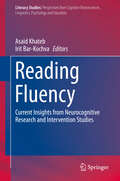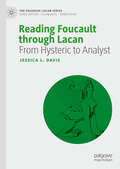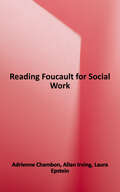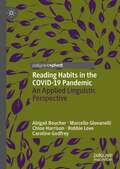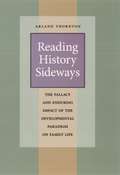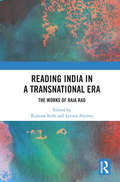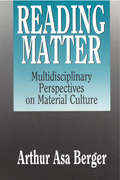- Table View
- List View
Reactions To the Law by Minority Religions (Routledge Inform Series on Minority Religions and Spiritual Movements)
by Eileen Barker and James T. RichardsonMuch has been written about the law as it affects new and minority religions, but relatively little has been written about how such religions react to the law. This book presents a wide variety of responses by minority religions to the legal environments within which they find themselves. An international panel of experts offer examples from North America, Europe and Asia demonstrating how religions with relatively little status may resort to violence or passive acceptance of the law; how they may change their beliefs or practices in order to be in compliance with the law; or how they may resort to the law itself in order to change their legal standing, sometimes by forging alliances with those with more power or authority to achieve their goals. The volume concludes by applying theoretical insights from sociological studies of law, religion and social movements to the variety of responses. The first systematic collection focussing on how minority religions respond to efforts at social control by various governmental agents, this book provides a vital reference for scholars of religion and the law, new religious movements, minority religions and the sociology of religion.
Reactions to the Market: Small Farmers in the Economic Reshaping of Nicaragua, Cuba, Russia, and China (Rural Studies)
by Laura J. EnríquezIt is manifest in developing countries around the world that the “shock” therapy administered to their economies by the neoliberal model of structural adjustment has failed, leaving much social and economic destruction in its wake. In Latin America this failure has led to a resurgence of interest in alternative models, some of them deploying various versions of socialism, as in Bolivia, Chile, and Venezuela, which has given rise to talk about the new “pink tide” enveloping the region. In this comparative study of four economies that have been making a transition to the market from their orthodox socialist pasts, Laura Enríquez focuses our attention on the plight of the small farmer in particular and on the importance of this sector for the overall socioeconomic success of the transition. Through this comparison, we see the similarities between Nicaragua and Russia in their rapid retreat from socialism and their adoption of reforms that have placed small agriculture, especially that focused on food crops, at a distinct disadvantage relative to export-oriented production. By contrast, Cuba has been more like China in adopting aspects of market reform while emphasizing small-scale cooperative and private farming in an effort to achieve food self-sufficiency. Drawing insights from Karl Polanyi’s study of the social and economic effects of the expansion of market relations in the nineteenth century, Enríquez highlights the role of the state in each of these countries in driving change in a certain direction: toward de-emphasis of small-scale farming and the eventual assumed demise of the peasantry in Nicaragua and Russia, which has led to countermovements of peasants struggling to survive, and toward the reconfirmation of the value of small farming in contributing to balanced economic development in Cuba and China.
Reactivation of the Built Environment: From Theory to Practice (SpringerBriefs in Applied Sciences and Technology)
by Daniele Fanzini Gianpiero VenturiniThe book deals with urban reactivation, a particular form of regeneration intervention which in addition to the physical-spatial dimension of the places also—and above all—considers the social and relational dynamics that the intervention is able to activate. In this sense, the concept of activation (or reactivation) emphasizes the act of putting something into or back into operation, whether it concerns the material components of a container (a building or a place) or the immaterial components of a content (a need, or a function), starting from the exploitation of opportunities that the architectural project contributes to revealing, developing and accompanying.
Reactive Attachment Disorder
by Daniel F. ShreeveA child's close bond with mother, father, or guardian usually provides a foundation for trust in all future attachments. Children deprived of early and healthy dependency--who do not form normal attachment with their caregivers--may later suffer from Reactive Attachment Disorder (RAD). This childhood disorder is characterized by a general failure in social relationships resulting from pathogenic care. Although first included in the third edition of the Diagnostic and Statistical Manual (DSM-III) in 1980, RAD is one of the more uncommon and understudied forms of psychopathology. Reactive Attachment Disorder: A Case-Based Approach adds to a now growing research base, providing scholars and clinicians with a well-rounded analysis of RAD and suggested treatments. The case-based approach used in this Brief follows the representative case of "Jorge," presented as unfolding over time and structured to illustrate challenges of diagnosis, to show examples of co-morbidity, and to provoke reflection on what questions may arise during treatment. Readers are asked to appraise the overlap with other clinical syndromes, the forms of psychotherapy which may apply, and the potential role of psychiatric medications as part of a comprehensive treatment plan.
Read the Label!: Discover what's really in your food
by Richard EmersonDo you know the difference between 'Use by' and 'Best before'? Or what is meant by 'Farmhouse' or 'Home-made'? And did you know that 75% of the salt we consume each day is added by food manufacturers during preparation or processing?Read the Label! is a must-have reference book that exposes the reality of food labelling and provides comprehensive information on how food manufacturers can manipulate the facts. With an in-depth examination of the common ingredients found in our foods, information on how far you can trust the food label and clear guidance on how to make an informed decision about the products you buy, this book will change the way you shop forever.
Reader's Guide to Lesbian and Gay Studies
by Timothy F. MurphyThe Reader's Guide to Lesbian and Gay Studies surveys the field in some 470 entries on individuals (Adrienne Rich); arts and cultural studies (Dance); ethics, religion, and philosophical issues (Monastic Traditions); historical figures, periods, and ideas (Germany between the World Wars); language, literature, and communication (British Drama); law and politics (Child Custody); medicine and biological sciences (Health and Illness); and psychology, social sciences, and education (Kinsey Report).
Reader's Guide to the Social Sciences (Reader's Guides Ser.)
by Jonathan MichieThis 2-volume work includes approximately 1,200 entries in A-Z order, critically reviewing the literature on specific topics from abortion to world systems theory. In addition, nine major entries cover each of the major disciplines (political economy; management and business; human geography; politics; sociology; law; psychology; organizational behavior) and the history and development of the social sciences in a broader sense.
Reading Across Worlds
by James Procter Bethan BenwellCombining sustained empirical analysis of reading group conversations with four case studies of classic and contemporary novels: Things Fall Apart, White Teeth, Brick Lane and Small Island, this book pursues what can be gained through a comparative approach to reading and readerships.
Reading Adorno: The Endless Road
by Amirhosein KhandizajiThis book draws on core concepts coined by Adorno, such as identity thinking, the culture industry, and his critique of the autonomous and rational subject, to address the ills that plague neoliberal capitalist societies today. These ills range from the risk of a return to totalitarian tendencies, to the global rise of the far-right, and anti-feminist conceptions of motherhood. Subsequent chapters outline the ways in which Adorno's thought can also be seen to redress the challenges of modern societies, such as the critical function of artworks, and the subversive potential of slow-food and popular music. The important underlying concern of the book is to highlight the continuing relevance of Adorno, both in dealing with the failures of neo-liberal capitalist societies, and in his applicability to a wide range of disciplines.
Reading Ads Socially
by Robert GoldmanThis systematic and authoritative book provides an unrivalled guide to understanding ad culture. It shows how the logic of commodities permeates the ways we think about ourselves, our relationships and our desires. Richly illustrated and written with great clarity, it will be essential reading for anyone interested in ad culture.
Reading Bernstein, Researching Bernstein
by Brian Davies Johan Muller Ana MoraisBasil Bernstein is arguably one of the most important educational theorists of the late 20th century. Whilst most academics and students in sociology of education know of Bernstein, few can claim to fully understand the scope and power of his work, which simply cannot be matched by any of his contemporaries.This book, written by a team of international contributors, offers an insight into the richness and depth of his theories. It demonstrates the growing recognition of the value of Bernstein's work to understanding unfolding developments in education systems around the world today.The volume is divided into four sections:* Section 1 considers the work of the theorists that Bernstein worked 'through' and 'with', from Durkheim and Marx to Bourdieu and Foucault* Section 2 focuses on teaching and learning in school contexts and draw on current issues like boy's underachievement, citizenship, system reform and language learning in varied cultural contexts* Section 3 applies Bernstein's theories to teacher education* Section 4 focuses on international and higher educationThis comprehensive text will show the international academic community in education and sociology - as well as students on education, sociology, sociolinguistic and social pyschology degrees - how to read and use Bernstein.
Reading Castaneda: A Prologue to the Social Sciences (Routledge Revivals)
by David SilvermanCarlos Castaneda’s accounts of his meeting with the Yaqui Indian magician Don Juan are well known to sociologists both in Britain and in America. Using material largely from Castaneda’s The Teachings of Don Juan, David Silverman here seeks to introduce the student of Sociology to some of the central epistemological concerns of social science. First published in 1975, the title assumes no previous knowledge of Castaneda but instead uses his work as a springboard to wider issues, in particular making sense of our reality and understanding each other by using language and communication. This is an interesting reissue, which will be of particular value to students of the sociology of language and communication, as well as Communication Studies more generally.
Reading Cavell's The World Viewed: A Philosophical Perspective on Film
by Marian Keane William RothmanIn their thoughtful study of one of Stanley Cavell's greatest yet most neglected books, William Rothman and Marian Keane address this eminent philosopher's many readers, from a variety of disciplines, who have neither understood why he has given film so much attention, nor grasped the place of The World Viewed within the totality of his writings about film. Rothman and Keane also reintroduce The World Viewed to the field of film studies. When the new field entered universities in the late 1960s, it predicated its legitimacy on the conviction that the medium's artistic achievements called for serious criticism and on the corollary conviction that no existing field was capable of the criticism filmed called for. The study of film needed to found itself, intellectually, upon a philosophical investigation of the conditions of the medium and art of film. Such was the challenge The World Viewed took upon itself. However, film studies opted to embrace theory as a higher authority than our experiences of movies, divorcing itself from the philosophical perspective of self-reflection apart from which, The World Viewed teaches, we cannot know what movies mean, or what they are. Rotham and Keane now argue that the poststructuralist theories that dominated film studies for a quarter of a century no longer compel conviction, Cavell's brilliant and beautiful book can provide a sense of liberation to a field that has forsaken its original calling. read in a way that acknowledges its philosophical achievement, The World Viewed can show the field a way to move forward by rediscovering its passion for the art of film. Reading Cavell's The World Viewed will prove invaluable to scholars and students of film and philosophy, and to those in other fields, such as literary studies and American studies, who have found Cavell's work provocative and fruitful.
Reading Classes
by Barbara JensenDiscussions of class make many Americans uncomfortable. This accessible book makes class visible in everyday life. Solely identifying political and economic inequalities between classes offers an incomplete picture of class dynamics in America, and may not connect with people's lived experiences. In Reading Classes, Barbara Jensen explores the anguish caused by class in our society, identifying classism-or anti–working class prejudice-as a central factor in the reproduction of inequality in America. Giving voice to the experiences and inner lives of working-class people, Jensen-a community and counseling psychologist-provides an in-depth, psychologically informed examination of how class in America is created and re-created through culture, with an emphasis on how working- and middle-class cultures differ and conflict. This book is unique in its claim that working class cultures have positive qualities that serve to keep members within them; that can haunt those who leave them behind. Through both autobiographical reflections on her dual citizenship in the working class and middle class and the life stories of students, clients, and relatives, Jensen brings into focus the clash between the realities of working-class life and middle-class expectations for working-class people. Focusing on education, she finds that at every point in their personal development and educational history, working-class children are misunderstood, ignored, or disrespected by middle-class teachers and administrators. Education, while often hailed as a way to "cross classes," brings with it its own set of conflicts and internal struggles. These problems can lead to a divided self, resulting in alienation and suffering for the upwardly mobile student. Jensen suggests how to increase awareness of the value of working-class cultures to a truly inclusive American society at personal, professional, and societal levels.
Reading Clocks, Alla Turca: Time and Society in the Late Ottoman Empire
by Avner WishnitzerUp until the end of the eighteenth century, the way Ottomans used their clocks conformed to the inner logic of their own temporal culture. However, this began to change rather dramatically during the nineteenth century, as the Ottoman Empire was increasingly assimilated into the European-dominated global economy and the project of modern state building began to gather momentum. In Reading Clocks, Alla Turca, Avner Wishnitzer unravels the complexity of Ottoman temporal culture and for the first time tells the story of its transformation. He explains that in their attempt to attain better surveillance capabilities and higher levels of regularity and efficiency, various organs of the reforming Ottoman state developed elaborate temporal constructs in which clocks played an increasingly important role. As the reform movement spread beyond the government apparatus, emerging groups of officers, bureaucrats, and urban professionals incorporated novel time-related ideas, values, and behaviors into their self-consciously "modern" outlook and lifestyle. Acculturated in the highly regimented environment of schools and barracks, they came to identify efficiency and temporal regularity with progress and the former temporal patterns with the old political order. Drawing on a wealth of archival and literary sources, Wishnitzer's original and highly important work presents the shifting culture of time as an arena in which Ottoman social groups competed for legitimacy and a medium through which the very concept of modernity was defined. Reading Clocks, Alla Turca breaks new ground in the study of the Middle East and presents us with a new understanding of the relationship between time and modernity.
Reading Comics
by Douglas WolkSuddenly, comics are everywhere: a newly matured art form, filling bookshelves with brilliant, innovative work and shaping the ideas and images of the rest of contemporary culture. InReading Comics, critic Douglas Wolk shows us why this is and how it came to be. Wolk illuminates the most dazzling creators of modern comics-from Alan Moore to Alison Bechdel to Dave Sim to Chris Ware-and introduces a critical theory that explains where each fits into the pantheon of art. Reading Comicsis accessible to the hardcore fan and the curious newcomer; it is the first book for people who want to know not just what comics are worth reading, but also the ways to think and talk and argue about them.
Reading Comics
by Douglas WolkSuddenly, comics are everywhere: a newly matured art form, filling bookshelves with brilliant, innovative work and shaping the ideas and images of the rest of contemporary culture. In Reading Comics, critic Douglas Wolk shows us why this is and how it came to be. Wolk illuminates the most dazzling creators of modern comics-from Alan Moore to Alison Bechdel to Dave Sim to Chris Ware-and introduces a critical theory that explains where each fits into the pantheon of art. Reading Comics is accessible to the hardcore fan and the curious newcomer; it is the first book for people who want to know not just what comics are worth reading, but also the ways to think and talk and argue about them.
Reading Ethnographic Research: A Critical Guide (Longman Social Research Series)
by Martyn HammersleyProvides a practical guide to the critical reading of ethnographic studies: discussing in detail how to identify the main arguments and what is involved in making an assessment of such studies.
Reading Fluency
by Asaid Khateb Irit Bar-KochvaThe book is dedicated to the blessed memory of Prof. Zvia Breznitz, whose groundbreaking research has made a tremendous impact on the understanding of fluency in reading. The book presents a multidimensional perspective of recent research and reviews on fluency in reading. The first part presents recent brain-imaging findings from studies into the neurobiological basis of reading, as well as cognitive and language studies exploring the underlying factors of fluency in reading and its development. The second part comprises reviews of intervention studies that address reading ability, and in particular, fluency in reading. The book provides a unique multilingual perspective on reading research by including studies of readers of different orthographies and speakers of different languages. Both scientists exploring the different aspects of reading and language, and clinicians of reading intervention will find this book not only of great interest but extremely useful in its clear and in-depth presentation of current reading research.
Reading Foucault Through Lacan: From Hysteric to Analyst (The Palgrave Lacan Series)
by Jessica L. DavisJacques Lacan and Michel Foucault are often cast as intellectual adversaries, their legacies marked by differences in method, lineages, and analytical priorities. Yet beneath their distinct projects lies a shared ambition: to decenter the Western conception of the subject while critically engaging with the notion of subjectivity in post-Kantian thought. This book examines Foucault’s critical project through the lens of Lacan’s theory of the four discourses, introduced in Seminar XVII: The Other Side of Psychoanalysis (1969-70). Divided into two parts, Reading Foucault through Lacan unfolds as a dialogue between the discourses of the Hysteric and the Analyst. Part I, “The Hysteric,” reframes Foucault’s genealogical critique from the early to mid-1970s as a form of hysterical questioning directed at Kant’s transcendental legacy and its aftermath. Through an exploration of how violence and embodied resistance interact in a discursive framework, Part I uncovers the epistemological fractures that mark the modern subject. Part II, “The Analyst,” examines Foucault’s redefinition of Kantian critique as a historically situated engagement with the present. Building on Lacan’s claim that analytic experience begins with the hystericization of discourse, this section views Foucault’s re-alignment with Kant as retroactively constituting the transformation from Hysteric to Analyst. Addressing themes such as parrhesia, transference, and the ethics of speaking, Part II examines discourse as a social link that transcends fixed identities to inhabit new modes of being. Drawing on newly available English translations of Foucault’s lectures and Lacan’s seminars, this book bridges two key trajectories in French thought and offers valuable insights for scholars of psychoanalysis, critical theory, and social philosophy.
Reading Foucault for Social Work
by Adrienne Chambon Allan Irving Laura EpsteinThis is the first book-length introduction to the work of Michel Foucault in social work. The social work profession is being challenged today to adapt to changing societal and cultural conditions and to carve out a new societal niche. Foucault's work offers a particularly relevant entry point for revisiting social work's mission, activities, and objectives. A critical reexamination of its practices, institutional arrangements, and knowledge helps us to envision alternative social work practices and strategies for social change. Each chapter emphasizes different notions from Foucault's writings. Contributions include conceptual, philosophical, and methodological considerations, and discussions from various fields and levels of practice. The book covers policy in child welfare and child protection; gay-lesbian youth services; grief work and the family; client-worker interaction in a welfare office; and the social movement of the elderly. It includes a roundtable discussion with Foucault on social work and a glossary.
Reading Habits in the COVID-19 Pandemic: An Applied Linguistic Perspective
by Marcello Giovanelli Robbie Love Chloe Harrison Abigail Boucher Caroline GodfreyThis book presents and analyses the results of the Lockdown Library Project survey, using a range of quantitative and qualitative approaches to provide a unique insight into the ways in which the first UK COVID-19 lockdown affected public reading habits. The authors begin by outlining the background to the study, the research methodology and design, and an overview of the headlines of the data, before going on to survey the literature on the relationship between pandemics, literature (especially the role played by genre and popular fiction) and reading habits. They then examine how participants reported that the lockdown period had affected the amount that they read; how they accessed books and discussed their reading with others; the use of reading as a coping strategy; and returning to re-read books that offered familiarity, reliability, and nostalgia. Finally, the concluding chapter brings together the overall findings of the project and briefly outlines future work in the field. This book will be of interest to academics in fields such as literary and genre studies, applied linguistics, corpus linguistics, stylistics, health humanities, and sociology, as well as practitioners working in education, in bibliotherapy, and in libraries.
Reading History Sideways: The Fallacy and Enduring Impact of the Developmental Paradigm on Family Life
by Arland ThorntonEuropean and American scholars from the eighteenth through the mid-twentieth centuries thought that all societies passed through the same developmental stages, from primitive to advanced. Implicit in this developmental paradigm—one that has affected generations of thought on societal development—was the assumption that one could "read history sideways. " That is, one could see what the earlier stages of a modern Western society looked like by examining contemporaneous so-called primitive societies in other parts of the world. In Reading History Sideways, leading family scholar Arland Thornton demonstrates how this approach, though long since discredited, has permeated Western ideas and values about the family. Further, its domination of social science for centuries caused the misinterpretation of Western trends in family structure, marriage, fertility, and parent-child relations. Revisiting the "developmental fallacy," Thornton here traces its central role in changes in the Western world, from marriage to gender roles to adolescent sexuality. Through public policies, aid programs, and colonialism, it continues to reshape families in non-Western societies as well.
Reading India in a Transnational Era: The Works of Raja Rao
by Rumina Sethi; Letizia AlternoThis anthology demonstrates the significance of Raja Rao’s writing in the broader spectrum of anti-colonial, postcolonial and diasporic writing in the 20th Century. In addition to highlighting Rao’s significant presence in Indian writing, the volume presents a range of previously unpublished material which contextualises Rao’s work within 20th-century modernist, postmodernist and postcolonial trends. Exploring both his fictional and non-fictional works, Reading India in a Transnational Era engages with issues of subaltern agency and national belonging, authenticity, subjectivity, internationalism, multicultural politics, postcolonialism and literary and cultural representation through language and translation. A literary volume that discusses gender and identity on both socio-political grounds, apart from dealing with Rao’s linguistic experimentations in a transnational era, this book will be of interest among scholars and researchers of English, postcolonial and world literature, cultural theory and Asian studies.
Reading Matter: Multidisciplinary Perspectives on Material Culture
by Arthur Asa BergerTo be civilized involves, among other things, making, using, and buying objects. Although speculation on the significance of objects often tends to be casual, there are professionals--anthropologists, historians, semioticians, Marxists, sociologists, and psychologists--who analyze material culture in a systematic way and attempt to elicit from it reliable information about people, societies, and cultures. One reason that analyzing objects has been problematical for scholars is the lack of a sound methodology governing multidisciplinary research. Reading Matter addresses this problem by defining a comprehensive set of methodological approaches that can be used to analyze and interpret material culture and relate it to personality and society.Berger offers discussions of the main concepts found in semiotic, historical, anthropological, psychoanalytic, Marxist, and sociological analysis. He provides practical descriptions of the working methods of each discipline and demarcates their special areas of investigation. Berger's lively discussions include a wealth of illustrative examples that help to clarify the complex and often difficult theories that underlie interpretations of material culture. In the second part of his analysis, Berger uses these disciplines to investigate one subject--fashion and an important aspect of fashion, blue jeans, and what the author calls the denimization phenomenon. Here he shows how different methods of reading material culture end up with different perspectives on things--even when they are dealing with the same topic.The author's focus is on the material culture of post-literate societies and cultures, both contemporary and historical. This comparative approach enables the reader to trace the evolution of objects from past to present or to see how American artifacts spread to different cultures, acquiring a wholly new meaning in the process. Reading Matter is an important contribution to the study of popula
